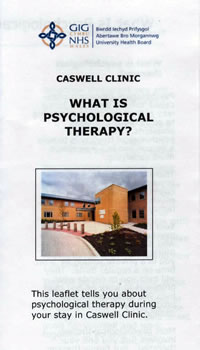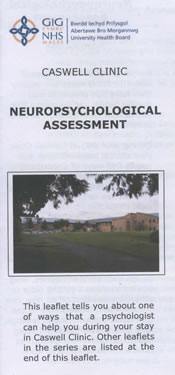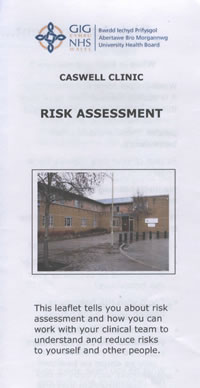Issue 27
Psychology Department Leaflets
The Psychology Department have produced leaflets to help you understand more about what psychologists and therapists do and what you can expect from them during your stay in Caswell Clinic. The leaflets cover psychological therapy, risk assessment and neuropsychological assessment. Each of the leaflets is explained in more detail below.
Leaflet 1: What is psychological therapy?
 This leaflet begins by explaining that psychological therapy, often called "talking therapy", is a way of thinking about and dealing with everyday problems. There are lots of different types of therapies such as cognitive behavioural therapy or psychodynamic psychotherapy.
This leaflet begins by explaining that psychological therapy, often called "talking therapy", is a way of thinking about and dealing with everyday problems. There are lots of different types of therapies such as cognitive behavioural therapy or psychodynamic psychotherapy.
The second part of this leaflet explains more about therapists and what they do. At Caswell Clinic, your therapist will either be a clinical nurse specialist or a clinical psychologist. A clinical nurse specialist is a qualified mental health nurse who has further training in psychological therapy. A clinical psychologist has a degree in psychology and further training in clinical psychology. Clinical nurse specialists and clinical psychologists use psychological therapies to help people understand their mental health difficulties. You and your therapist may discuss what problems you have, how they started and what keeps them going. Most importantly, they will help you learn new ways of coping with problems.
Leaflet 2: Risk Assessment

The aim of this leaflet is to help you understand more about risk assessment, the importance of it, what is involved and how to reduce your own risk. This leaflet explains that when people come to Caswell Clinic it is usually because they have done things that have caused harm to themselves or other people, these are called risk behaviours. At Caswell Clinic, a psychologist may carry out a risk assessment by asking questions about your history, your thoughts, feelings and behaviours or by asking you to complete questionnaires. This helps you and your team to understand why your risk behaviours happened and what can be done to help you deal with situations differently in the future. The aim of risk assessment is to help you have a better quality of life and for you to feel confident about coping with problems.
Leaflet 3: Neuropsychological Assessment
 The purpose of this leaflet is to explain what a neuropsychological assessment is and what it will involve. Sometimes people who come to Caswell Clinic have difficulties with their memory, concentration and thinking. This can be caused by lots of different things such as head injury, drug or alcohol misuse, getting older or mental health problems such as anxiety, depression or schizophrenia. Your psychologist at Caswell Clinic will try to help you identify your strengths as well as the difficulties you may be having.
The purpose of this leaflet is to explain what a neuropsychological assessment is and what it will involve. Sometimes people who come to Caswell Clinic have difficulties with their memory, concentration and thinking. This can be caused by lots of different things such as head injury, drug or alcohol misuse, getting older or mental health problems such as anxiety, depression or schizophrenia. Your psychologist at Caswell Clinic will try to help you identify your strengths as well as the difficulties you may be having.
The neuropsychological assessment usually involves some questionnaires and some puzzles and problem solving tasks. The assessment can last between 1-2 hours at a time and you may be seen for a few sessions. At the end of the assessment, your psychologist will speak to you about your strengths and difficulties and will make recommendations about the kinds of treatments that may help you.





